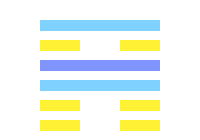56.1.2.4.5 (56 > 9)

56.1.2.4.5 (56 > 9) - THE LÜ HEXAGRAM.
- 1. The first line, divided, shows the stranger mean and meanly occupied. It is thus that he brings on himself (further) calamity.
- 2. The second line, divided, shows the stranger, occupying his lodging-house, carrying with him his means of livelihood, and provided with good and trusty servants.
- 4. The fourth line, undivided, shows the traveller in a resting-place, having (also) the means of livelihood and the axe, (but still saying), ‘I am not at ease I in my mind.’
- 5. The fifth line, divided, shows its subject shooting a pheasant. He will lose his arrow, but in the end he will obtain praise and a (high) charge.
56.1.2.4.5 (56 > 9) - Searching
One asks one's allies not to linger any longer.
Bing DeepL Google Yandex56.1.2.4.5 (56 > 9) - Searching
One asks one's allies not to linger any longer.
Bing DeepL Google Yandex56.1.2.4.5 (56 > 9) - Lu, le voyageur
Lu : voyageur, hôte, étranger, loger ; bon arrangement.
- 1. Les étrangers ambulants, petits et faibles, sont exposés à bien des maux. [Quand le but est bas, les calamités s’ensuivent.]
- 2. L’étranger qui s’est établi quelque part doit y déposer tous ses biens et se procurer des serviteurs jeunes et habiles ; il lui arrivera bonheur.
- 4. Il peut s’être établi quelque part, y avoir ses biens et sa hache, mais son cœur n’est point encore à l’aise et en sûreté. (Il n’a point une situation assurée, il doit veiller.)
- 5. Il tire un faisan et sa flèche s’échappe une fois (manque le but) ; à la fin, par les louanges qu’il sait mériter, il reçoit accueil et fonction du prince.
56.1.2.4.5 (56 > 9) - Chercher
On demande à ses alliés de ne pas s'attarder davantage.
Bing DeepL Google Yandex56.1.2.4.5 (56 > 9) - Keresés
- 1. Ha valaki nagy veszteségeket szenvedett, nem engedheti el magát.
- 2. Találkozik valakivel aki segíteni szeretne.
- 4. Védi magát a többiektől, nem teszi jól.
- 5. Felkészül az alternatívákra ha szükséges.
The trigrams
The trigrams are combinations of three yin and yang lines. The three bottom lines of the hexagram form the lower trigram and represent the inner situation. The three top lines form the upper trigram and represent the outer situation.
Upper trigram: The fire The wind


Lower trigram: The mountain The sky


The formation: 56
What is already there

56 - THE LÜ HEXAGRAM.
Lü intimates that (in the condition which it denotes) there may be some little attainment and progress. If the stranger or traveller be firm and correct as he ought to be, there will be good fortune.
Bing DeepL Google Yandex56 - Lu, le voyageur
Lu : voyageur, hôte, étranger, loger ; bon arrangement.
Lu « bon arrangement ». Avec un faible commencement, le bon arrangement conduit au succès, à la consolidation, au bonheur.
Texte
L’étranger ambulant prospère difficilement. S’il est juste et droit, il aura une heureuse fortune.
Symbolisme
Le feu au-dessus d’une montagne. Ainsi le grand et sage fait briller sa droiture en appliquant les lois pénales et ne laisse pas durer les différends et les procès.
Commentaire
Si le faible acquiert, maintient sa droiture chez les étrangers et reste soumis au fort, il sera stable et attaché à la claire vérité. Ainsi l’étranger nomade, faible au commencement, prospérera et s’affermira s’il est droit et juste.

56.1 (56 > 30) - THE LÜ HEXAGRAM.
The first line, divided, shows the stranger mean and meanly occupied. It is thus that he brings on himself (further) calamity.
Bing DeepL Google Yandex56.1 (56 > 30) - Coping
When one has suffered great losses, one must not let oneself go.
Bing DeepL Google Yandex56.1 (56 > 30) - Coping
When one has suffered great losses, one must not let oneself go.
Bing DeepL Google Yandex56.1 (56 > 30) - Lu, le voyageur
Lu : voyageur, hôte, étranger, loger ; bon arrangement.
Les étrangers ambulants, petits et faibles, sont exposés à bien des maux. [Quand le but est bas, les calamités s’ensuivent.]
Bing DeepL Google Yandex56.1 (56 > 30) - Tenir le coup
Quand on a beaucoup perdu, on ne doit pas se laisser aller.
Bing DeepL Google Yandex56.1 (56 > 30) - Keresés
Ha valaki nagy veszteségeket szenvedett, nem engedheti el magát.
Bing DeepL Google Yandex
56.2 (56 > 50) - THE LÜ HEXAGRAM.
The second line, divided, shows the stranger, occupying his lodging-house, carrying with him his means of livelihood, and provided with good and trusty servants.
Bing DeepL Google Yandex56.2 (56 > 50) - Believing without evidence
One meets a person who is well disposed towards one.
Bing DeepL Google Yandex56.2 (56 > 50) - Believing without evidence
One meets a person who is well disposed towards one.
Bing DeepL Google Yandex56.2 (56 > 50) - Lu, le voyageur
Lu : voyageur, hôte, étranger, loger ; bon arrangement.
L’étranger qui s’est établi quelque part doit y déposer tous ses biens et se procurer des serviteurs jeunes et habiles ; il lui arrivera bonheur.
Bing DeepL Google Yandex56.2 (56 > 50) - Croire sans preuves
On rencontre une personne bien disposée envers nous.
Bing DeepL Google Yandex
56.4 (56 > 52) - THE LÜ HEXAGRAM.
The fourth line, undivided, shows the traveller in a resting-place, having (also) the means of livelihood and the axe, (but still saying), ‘I am not at ease I in my mind.’
Bing DeepL Google Yandex56.4 (56 > 52) - Losing legitimacy
When one defends oneself from others, one sees that things are not going well.
Bing DeepL Google Yandex56.4 (56 > 52) - Losing legitimacy
When one defends oneself from others, one sees that things are not going well.
Bing DeepL Google Yandex56.4 (56 > 52) - Lu, le voyageur
Lu : voyageur, hôte, étranger, loger ; bon arrangement.
Il peut s’être établi quelque part, y avoir ses biens et sa hache, mais son cœur n’est point encore à l’aise et en sûreté. (Il n’a point une situation assurée, il doit veiller.)
Bing DeepL Google Yandex56.4 (56 > 52) - Perdre sa légitimité
En se défendant des autres, on voit que ça ne va pas.
Bing DeepL Google Yandex
56.5 (56 > 33) - THE LÜ HEXAGRAM.
The fifth line, divided, shows its subject shooting a pheasant. He will lose his arrow, but in the end he will obtain praise and a (high) charge.
Bing DeepL Google Yandex56.5 (56 > 33) - Working cleanly
One prepares alternative solutions if necessary.
Bing DeepL Google Yandex56.5 (56 > 33) - Working cleanly
One prepares alternative solutions if necessary.
Bing DeepL Google Yandex56.5 (56 > 33) - Lu, le voyageur
Lu : voyageur, hôte, étranger, loger ; bon arrangement.
Il tire un faisan et sa flèche s’échappe une fois (manque le but) ; à la fin, par les louanges qu’il sait mériter, il reçoit accueil et fonction du prince.
Bing DeepL Google Yandex56.5 (56 > 33) - Travailler proprement
On prépare des solutions alternatives si nécessaire.
Bing DeepL Google YandexIn the making: 9
What is poised to happen

9 - THE HSIÂO KHÛ HEXAGRAM.
Hsiâo Khû indicates that (under its conditions) there will be progress and success. (We see) dense clouds, but no rain coming from our borders in the west.
Bing DeepL Google Yandex9 - Siao tchu, le petit rassemblement
Siao tchu : petit entretien ; éducation, correction ; arrêt.
Texte
L’entretien, l’éducation est comme un gros nuage venant sans pluie des contrées occidentales et contribuant au développement des êtres.
Symbolisme
Le vent soufflant au-dessus du ciel. Ainsi le grand et sage élève et fait briller la vertu.
Commentaire
Le peuple est entretenu quand la bonté occupe le pouvoir et que grands et petits s’y accommodent entre eux. Avec bonté ferme chez les uns et soumission chez les autres, la puissance atteint son but, les desseins utiles s’exécutent. La figure du premier texte représente la prospérité comme le nuage avançant mais non encore répandu largement.
9 - L'apparence
Quelque chose n'est pas encore visible mais sera révélé plus tard.
Bing DeepL Google YandexThe nuclear hexagram: 28.1.3.5.6 (28 > 38)
The nuclear hexagram is the association of the two inner trigrams (lines 2,3,4 and 3,4,5). It represents the root, or the origin of the situation.

28.1.3.5.6 (28 > 38) - THE TÂ KWO HEXAGRAM.
- 1. The first line, divided, shows one placing mats of the white mâo grass under things set on the ground. There will be no error.
- 3. The third line, undivided, shows a beam that is weak. There will be evil.
- 5. The fifth line, undivided, shows a decayed willow producing flowers, or an old wife in possession of her young husband. There will be occasion neither for blame nor for praise.
- 6. The topmost line, divided, shows its subject with extraordinary (boldness) wading through a stream, till the water hides the crown of his head. There will be evil, but no ground for blame.
28.1.3.5.6 (28 > 38) - Wanting the happiness of one' s family
One wishes to have more power to surround one's relatives with benefits.
Bing DeepL Google Yandex28.1.3.5.6 (28 > 38) - Wanting the happiness of one' s family
One wishes to have more power to surround one's relatives with benefits.
Bing DeepL Google Yandex28.1.3.5.6 (28 > 38) - Tá kvoh, le grand excès
Tá kvoh : 1. Grand excès, défaut, manquement ; 2. Traverser, dépasser.
-
1. Ceci est susceptible de deux explications : a. « S’appuyer sur des joncs » est un grand défaut ; ils plient et ne soutiennent pas. b. Pour placer un objet comme natte à offrande, se servir de mao blanc est fautif.
Note. Au lieu de gratter simplement la terre et l’aplanir.
(Le mao blanc représente la pureté, la droiture, kiet tche. Ceci d’après le commentaire représente un excès de précaution. Kwéh hu weï shin (1er sens). - 3. Une poutre, un pilier trop faible (voir texte I) sont mauvais (ils ne peuvent supporter) (grand défaut).
- 5. Un vieux saule produisant une fleur, une vieille femme épousant un homme encore jeune, quoique non blâmables, ne peuvent être loués. La fleur du vieux saule ne peut durer, l’époux d’une vieille femme peut s’en dégoûter. (Faits qui passent les règles ordinaires.)
- 6. Traversant un fleuve, y entrer jusqu’au sommet de la tête est chose dangereuse, (mais peut n’être point blâmable, si on le fait pour aider quelqu’un, d’après le Com.) (3e sens). Force défaillante.
28.1.3.5.6 (28 > 38) - Vouloir le bonheur des siens
On souhaite avoir davantage de pouvoir pour entourer ses proches de bienfaits.
Bing DeepL Google Yandex28.1.3.5.6 (28 > 38) - Lemondás
- 1. Fejlődni akar a gyengeség miatt.
- 3. Ápolja kapcsolatait.
- 5. Igyekszik javítani mielőtt mások észrevennék a hanyatlást.
- 6. Egyedül akar haladni a környezők gyengesége miatt.
Ruler
The starting situation

56.5 (56 > 33) - THE LÜ HEXAGRAM.
The fifth line, divided, shows its subject shooting a pheasant. He will lose his arrow, but in the end he will obtain praise and a (high) charge.
Bing DeepL Google Yandex56.5 (56 > 33) - Working cleanly
One prepares alternative solutions if necessary.
Bing DeepL Google Yandex56.5 (56 > 33) - Working cleanly
One prepares alternative solutions if necessary.
Bing DeepL Google Yandex56.5 (56 > 33) - Lu, le voyageur
Lu : voyageur, hôte, étranger, loger ; bon arrangement.
Il tire un faisan et sa flèche s’échappe une fois (manque le but) ; à la fin, par les louanges qu’il sait mériter, il reçoit accueil et fonction du prince.
Bing DeepL Google Yandex56.5 (56 > 33) - Travailler proprement
On prépare des solutions alternatives si nécessaire.
Bing DeepL Google YandexCorrection
The direction where the ruler is going to bend

56.1.2.4 (56 > 26) - THE LÜ HEXAGRAM.
- 1. The first line, divided, shows the stranger mean and meanly occupied. It is thus that he brings on himself (further) calamity.
- 2. The second line, divided, shows the stranger, occupying his lodging-house, carrying with him his means of livelihood, and provided with good and trusty servants.
- 4. The fourth line, undivided, shows the traveller in a resting-place, having (also) the means of livelihood and the axe, (but still saying), ‘I am not at ease I in my mind.’
56.1.2.4 (56 > 26) - Searching
One tests without bitterness a drug that others have designed for profit.
Bing DeepL Google Yandex56.1.2.4 (56 > 26) - Searching
One tests without bitterness a drug that others have designed for profit.
Bing DeepL Google Yandex56.1.2.4 (56 > 26) - Lu, le voyageur
Lu : voyageur, hôte, étranger, loger ; bon arrangement.
- 1. Les étrangers ambulants, petits et faibles, sont exposés à bien des maux. [Quand le but est bas, les calamités s’ensuivent.]
- 2. L’étranger qui s’est établi quelque part doit y déposer tous ses biens et se procurer des serviteurs jeunes et habiles ; il lui arrivera bonheur.
- 4. Il peut s’être établi quelque part, y avoir ses biens et sa hache, mais son cœur n’est point encore à l’aise et en sûreté. (Il n’a point une situation assurée, il doit veiller.)
56.1.2.4 (56 > 26) - Chercher
On teste sans amertume un médicament que les autres ont conçu pour faire des bénéfices.
Bing DeepL Google Yandex56.1.2.4 (56 > 26) - Keresés
- 1. Ha valaki nagy veszteségeket szenvedett, nem engedheti el magát.
- 2. Találkozik valakivel aki segíteni szeretne.
- 4. Védi magát a többiektől, nem teszi jól.

